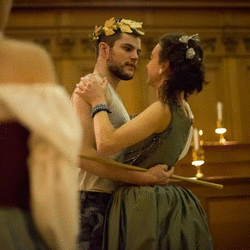Dido, Queen of Carthage (Cambridge)

© Stephen Smith
The restrained candle-lit elegance of Wren's chapel for Emmanuel College is reflected in the use of Purcell's music (notably the "When I am laid in earth" lament from Dido and Aeneas) for Dido, Queen of Carthage. It is an early Marlowe play but one flashed with fine poetry as well as drama, though it helps if you know Virgil's Aeneid.
Michael Oakley's production uses all the chapel, from chancel to organ loft, as its stage. Mark Friend's costumes range from a version of baroque for the queen, her court and her rejected suitor Iarbas to fatigues for the dispossessed Aeneas and the other fugitive Trojans. Friend otherwise lets the space and the drama speak for themselves.
Church and chapel acoustics have their own rules. They're not always favourable to complex spoken dialogue, as some of the speeches proved. Mary Galloway's Dido, at first something of a regal minx (did Marlowe have his own sovereign in mind?) and later a woman all-but obsessed with the possibility of late love proffered and then withdrawn, comes over as a strong and ultimately very moving characterisation.
Last seen as Hermes in Prometheus Bound, Joey Akubeze as Iarbus gives a well-spoken and thought-out portrait of a man whose initial generosity rebounds. Dido has a number of meaty women's roles, quite apart from its heroine, with sister Anna (Olivia Emden) and the warring divinities Venus (Georgia Wagstaff) and Juno (Charlotte Quinney) chief among them.
Rod puppets are used for Aeneas' son Ascanius and the mischievous Cupid who is substituted for him by one of Juno's tricks. Aeneas himself is someone who tends to come over as a bit of a stuffed shirt in most tellings of this tale; Julian Mack makes his inner conflicts between love and duty – of the past as well as the present – understandable.










